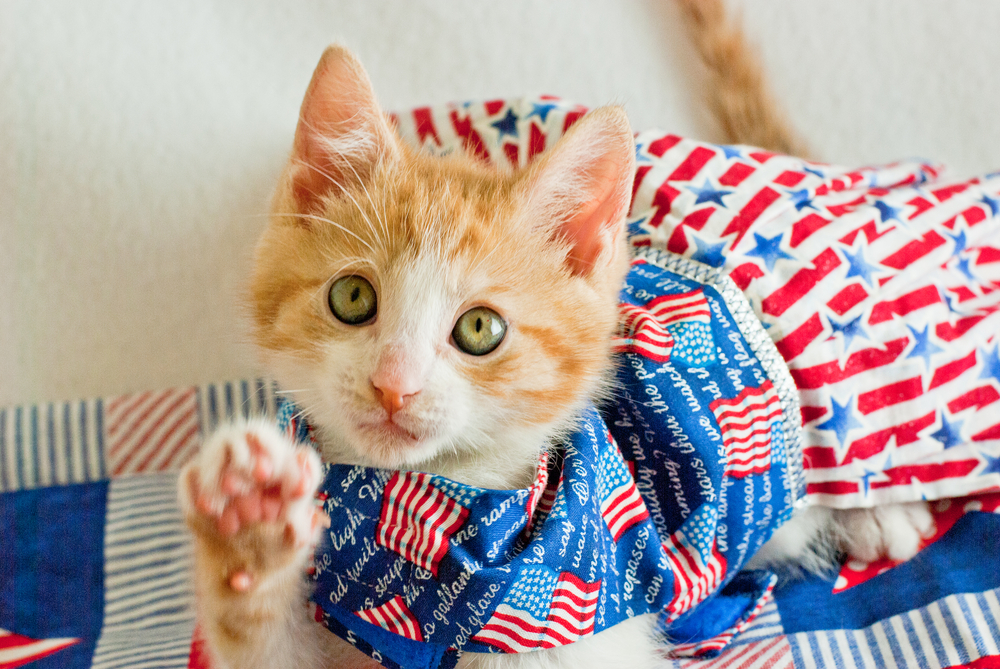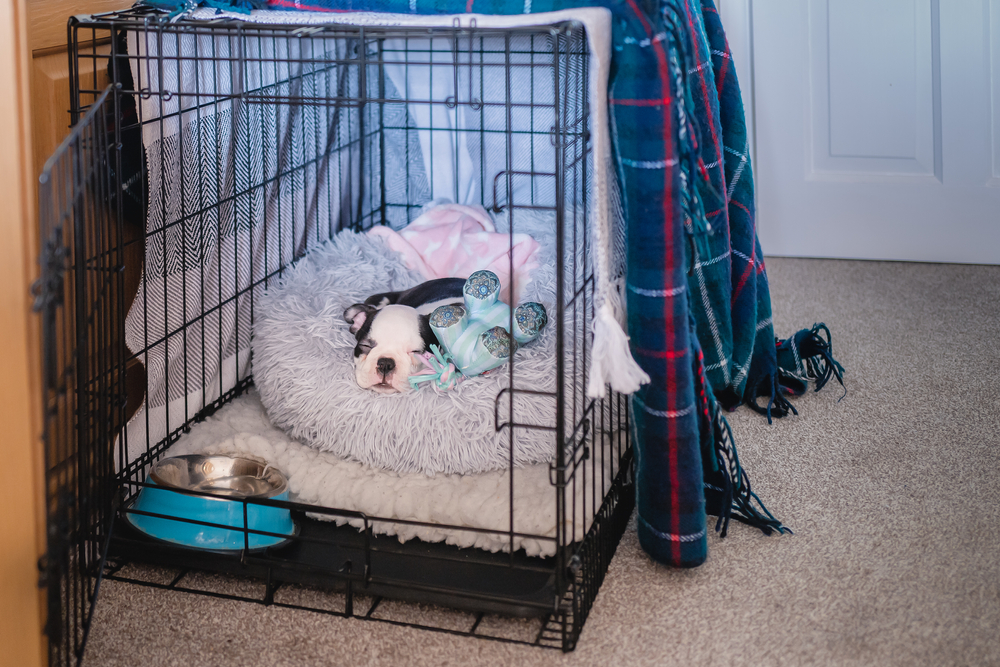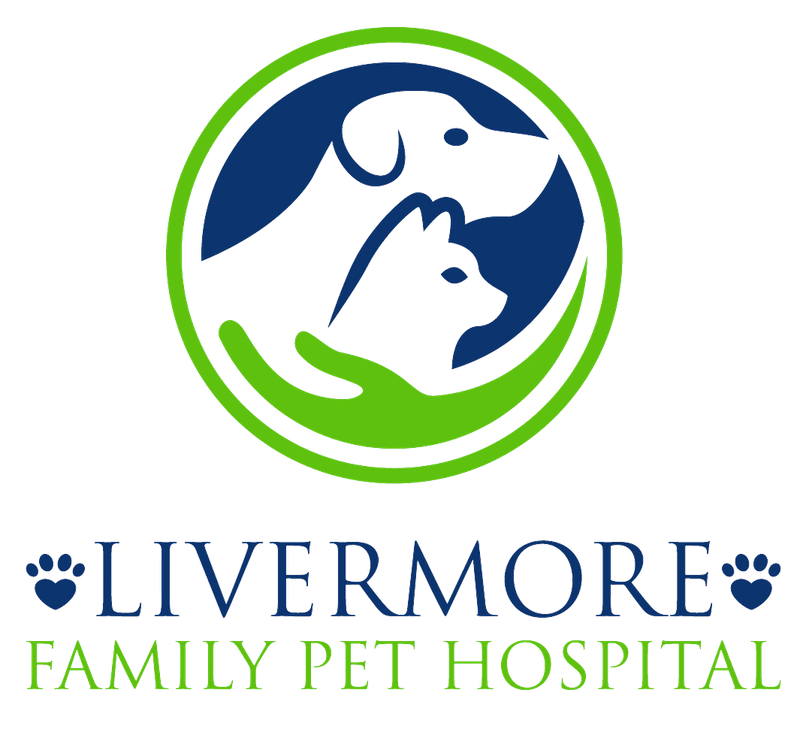
Traditional July Fourth celebrations can be overwhelming for some pets. The tantalizing smell of grilling meat, the sight of kids splashing in the pool, and the deafening boom of fireworks can trigger uncharacteristic and dangerous pet behavior.
Don’t let your July Fourth party fizzle out because you didn’t prepare for your pet and their possible anxiety. Follow these safety tips from Livermore Family Animal Hospital to ensure a safe and fun July Fourth for all.
What’s that sound? Fireworks safety for pets
Fireworks create a mesmerizing visual display, but their loud, unpredictable sounds can terrify dogs and cats. And, when pets panic, their first instinct is to flee. Every year, countless pets go missing around the July Fourth holiday and many do not return home. For this reason, we advise that you never take pets to a fireworks display and instead keep them safely confined at home—and wearing current identification.
Fireworks also pose other significant risks—they not only can cause serious burns or other injuries when lit or launched around pets, but also unlit or spent fireworks can be toxic if consumed by curious dogs. Therefore, treat all fireworks material like true explosives and keep everything out of your pet’s reach.
If your pet has noise-related anxiety, contact Livermore Family Animal Hospital. Our veterinarians may prescribe a short-term prescription for anti-anxiety medication to reduce fear and stress during fireworks.
Medium-rare, please—cookout safety for pets
Everyone gathers around the grill during summer holidays—for good reason—those tempting smells and sizzling sounds promise irresistibly tasty food. But, many curious pets can’t understand why they have to wait, and may reach up to a hot grill for a taste test, or drag away a steak not fully cooked.
Cookout-related injuries can include burns from the grill, searing hot food, or grease splatter, and punctures, abrasions, and lacerations from sharp utensils. Also, the irresistible food can lead to painful and potentially life-threatening pancreatitis, gastrointestinal obstruction, or choking.
Keep pets—and your food—safe with a few simple precautions, including:
- Confining your pet indoors during the grilling process
- Stationing the grill outside your pet’s reach
- Immediately removing food waste
- Never allowing your pet to chew on or consume bones, raw or cooked
- Keeping your pet on-leash during any group gatherings to prevent guests from mistakenly “rewarding” them with inappropriate food
Splish-splash—water safety for pets
If your festivities will be near a pool, lake, or other water body, continuously supervise your pet. Not all pets are natural swimmers, and your pet may not recognize water or realize its risks—resulting in panic, potential drowning, or overexertion. Also, people can put themselves at risk when they attempt to help a frightened pet.
Ensure your waterside experience is stress-free—not stressful—with these simple steps:
- Protect — Outfit your pet with a lifejacket whenever they are in or near the water.
- Restrict — Limit your pet’s swimming and water play to prevent fatigue, heat stress, and water toxicity.
- Avoid — Never let your pet swim in or drink stagnant, dirty, or algae-filled water, and do not let them drink saltwater.
- Offer — Provide plenty of fresh drinking water. If you’ll be boating, take your pet ashore every few hours for an elimination break.
Hot dog—heat stress and pets
Never underestimate the hot summer sun—heatstroke (i.e., heat exhaustion, heat stress) can quickly lead to death in pets and people. And, early heatstroke warning signs can be vague and often go unnoticed until the situation is severe.
When the temperature rises above 70 degrees, be alert for heat-related danger, and take the following precautions:
- Never leave your pet in the car — Cars heat up quickly and can result in heat-related death. Never leave your pet in a parked car for any length of time. Leaving the windows cracked open does not help.
- Exercise in the morning or evening — Restrict physical activity to the cooler parts of the day and avoid high-intensity exercise (e.g., fetch, running, chase, or play with other dogs).
- Avoid hot surfaces — Asphalt, concrete, and artificial turf can reach searing temperatures. Stay on the grass whenever possible.
- Provide water at all times — Take plenty of breaks, and ensure your pet has continuous access to water and shade.
- Leave your pet at home — Sometimes, the best celebration is a hearty nap. Consider letting your pet have a stay-cation this year.
Holiday hideaway—create a safe stress-free place for pets

For some pets, the holiday can be too much. If your pet is anxious or stressed around unfamiliar people, environmental changes, or loud noises, let them safely escape to a designated at-home hideaway.
In the weeks before July Fourth, prepare a quiet space in your home dedicated to your pet. Spend time with them so they learn that the space is calm and relaxing. Include the following:
- Comfortable bedding or a crate, if your pet is crate-trained
- Familiar toys, if your pet is not a destructive chewer
- Litter box
- Positive distractions (e.g., food-stuffed toys, hidden treats, or food puzzles)
- An Adaptil or Feliway calming pheromone diffuser
Before the big event, settle your pet in their safe space. Turn on the television or a radio, cover the windows, and close the door. Periodically check on your pet to ensure they are comfortable and relaxed, and be available to keep your pet company, if needed.
Summer can be a season of wonderful memories with family and friends—both two- and four-legged. For additional questions about noise-related anxiety and general summer safety, contact the Livermore Family Animal Hospitalteam.

